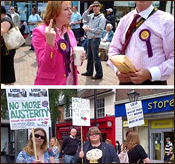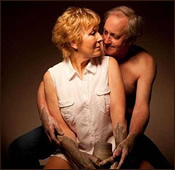A Triumph of Youth
 I often find myself in London the day after a major British election. I was here when it was confirmed that Boris Johnson had been re-elected as Mayor; it was as if some hidden force was compelling me to press my nose up against that spectacle. At just about the time that the result was announced, I walked past a storm grate from which a powerful stench arose: it seemed as if the city itself was suffering from terrible flatulence. When Tony Blair triumphed in 1997, I was staying at my parents’ London home: it was a summer’s day brought forward to May, and the sun was so radiant that the blue sky had turned almost white. I remained glued to my television set throughout the day as Blair proceeded to Buckingham Palace and then on to cheering crowds at Downing Street. Now that the 2014 local election has concluded, perhaps strangely, I am here again.
I often find myself in London the day after a major British election. I was here when it was confirmed that Boris Johnson had been re-elected as Mayor; it was as if some hidden force was compelling me to press my nose up against that spectacle. At just about the time that the result was announced, I walked past a storm grate from which a powerful stench arose: it seemed as if the city itself was suffering from terrible flatulence. When Tony Blair triumphed in 1997, I was staying at my parents’ London home: it was a summer’s day brought forward to May, and the sun was so radiant that the blue sky had turned almost white. I remained glued to my television set throughout the day as Blair proceeded to Buckingham Palace and then on to cheering crowds at Downing Street. Now that the 2014 local election has concluded, perhaps strangely, I am here again.
Whenever I arrive in London, I’m struck by the tremendous contrast it provides to other parts of the country. Bradford was once a very rich city: the Victorian homes in Manningham made of alabaster stone tell the tale, as does the resplendent St. George’s Hall in the centre of town, which resembles a Roman temple. Wool made the city fabulously wealthy, but then the textile industry disappeared; what remains are monuments to those boom times. The alabaster terraces in Manningham are now homes to immigrants from Mirpur and other parts of Pakistan who live a stone’s throw from a fast food establishment selling fried chicken. There have been worse times and better times since the term “Bradford industrialist” passed out of common currency, and there are signs of life in the city still, but nothing like the city’s original prosperity has returned as of yet.
London, on the other hand, is currently in the midst of a boom: this is not just evident in the numbers of people queuing to buy overpriced latte in Starbucks at Kings Cross, it was obvious in the cafés full to overflowing near Covent Garden, the little boutiques filled with irrelevant bric-a-brac that were making smartly-dressed professionals reach for their credit cards, the young people hanging off the base of the plinth at Trafalgar Square, smiling for selfies taken by the latest 4G phones to be posted on Twitter with the hashtag #bankholidayweekend. Pass by and roll on to neatly pressed streets; prior to coming down to London, I’d seen a Bradford Moor laundrette entitled “Clean Scene”, the windows were clouded with steam and the white paint on the establishment’s sign was peeling. In London, I passed by the “Celebrity Dry Cleaners”, its obsidian sign was lit with neon. Some people in dark suits, others in bright blue or purple or white tailored shirts stood outside of pubs, smoking and drinking pints of ale. I arrived at one place that not only served a range of foreign lagers, but also fine wines, gourmet cooking and Cuban cigars. No doubt the young woman in a black and yellow dress in that establishment who was chatting earnestly with a middle aged man with sandy hair who was trying to balance a conversation on one hand and glance at his Blackberry in the other felt their conversation was important. Perhaps it was: but it was a scene so full of lucre it seemed untouched by politics.
After finding a more modest pub for dinner, I thought a bit more about the election. All told, it had been a great result for the Bradford Labour Party: Councillor Mohammed Shafiq of Bradford Moor was returned to office, though by a tiny margin of 56 votes. Rizwana Jamil took the previously Tory held ward of Bowling and Barkerend by a massive 1669 votes, securing 56% of the total. And Naveeda Ikram, who in addition to being councillor for Little Horton, also was Britain’s first female Muslim mayor, romped home with 76% of the vote. Overall, Labour managed to regain control of the council.
There were other reasons to be happy with Bradford’s result: the Respect Party, or as it’s known these days, Respect (George Galloway), didn’t pick up a single seat. The UK Independence Party, far from accruing massive gains everywhere as was suggested by its acolytes at the BBC, was confined to Keighley West.
These results contained some disappointments. For example, I was very impressed by Labour’s candidate for Bolton and Undercliffe, Frank Dignan. He’s a barrister, well spoken and very articulate. Unfortunately his voice won’t be heard on the council this time around. In my own ward, Labour was also unsuccessful. Also, I don’t like that UKIP have any foothold whatsoever. Nevertheless, the “UKIP surge” simply didn’t happen: yes, there were some wards in Bradford where they came second, but there were also many in which they didn’t compete at all. All they have now is that one individual who will probably approach Bradford City Hall and find he has no allies in the chamber; he may even have problems figuring out where to hang his hat. No doubt his interventions will be few, his voice, largely ignored. It will be a long, possibly embittering term in office.
 Perhaps, however, he doesn’t qualify for the moniker of the “saddest” member of UKIP; that may be Neil Hamilton. For those unfamiliar with Mr. Hamilton, he along with his wife Christine, is more a reality television personality than an actual politician. The couple were infamous for providing documentary maker Louis Theroux with one of the weirdest of his “Weird Weekends” in which Christine made her unseemly attraction to Mr. Theroux quite plain. More seriously, the Hamiltons were implicated in a Cash for Questions scandal prior to the 1997 election. At that point, anti-corruption campaigner Martin Bell arrived wearing his white suit, and rather like a latter day Gandalf, drew the poison of the corrupt couple out of their Tatton constituency. Nevertheless, the Hamiltons were unable to take the hint that a period of prolonged if not eternal silence would be apropos. They left the Tories, joined UKIP and subsequently thrust themselves back into the limelight. Hamilton just tried to win a council seat in Wandsworth; he only accrued 396 votes, which presumably were from people who had never heard of him. He appeared on Channel Four News after this resounding defeat and spoke of the environment in London being challenging as so many of its denizens had been born elsewhere. The word “cosmopolitan” was also thrown into the mix. This impolitic outburst followed similarly simultaneously flattering yet denigrating comments by Suzanne Evans, a UKIP spokesperson, who said that her party had problems gaining support from the “educated, cultural and young.”
Perhaps, however, he doesn’t qualify for the moniker of the “saddest” member of UKIP; that may be Neil Hamilton. For those unfamiliar with Mr. Hamilton, he along with his wife Christine, is more a reality television personality than an actual politician. The couple were infamous for providing documentary maker Louis Theroux with one of the weirdest of his “Weird Weekends” in which Christine made her unseemly attraction to Mr. Theroux quite plain. More seriously, the Hamiltons were implicated in a Cash for Questions scandal prior to the 1997 election. At that point, anti-corruption campaigner Martin Bell arrived wearing his white suit, and rather like a latter day Gandalf, drew the poison of the corrupt couple out of their Tatton constituency. Nevertheless, the Hamiltons were unable to take the hint that a period of prolonged if not eternal silence would be apropos. They left the Tories, joined UKIP and subsequently thrust themselves back into the limelight. Hamilton just tried to win a council seat in Wandsworth; he only accrued 396 votes, which presumably were from people who had never heard of him. He appeared on Channel Four News after this resounding defeat and spoke of the environment in London being challenging as so many of its denizens had been born elsewhere. The word “cosmopolitan” was also thrown into the mix. This impolitic outburst followed similarly simultaneously flattering yet denigrating comments by Suzanne Evans, a UKIP spokesperson, who said that her party had problems gaining support from the “educated, cultural and young.”
Bradford and London are very different in terms of wealth, both are united by being “young places”. Bradford’s demographic profile makes it one of the most youthful places in the country, London is a place to which the young gravitate and which engenders a youthful, open outlook. The comprehensive rejection of UKIP by youth in both areas indicates that it hasn’t much of a future. Its insular, backward looking philosophy doesn’t fit with the Bradford denizen whose parents came from Mirpur or Bratislava; it doesn’t sit well with the owner of the Celebrity Dry Cleaners who probably has to navigate every sort of accent and language in order to find out whether he ought to apply starch or not. It doesn’t make sense in a world that is ever more driven by interconnected technology and international trade to pull up the drawbridge and tell everyone to go away.
I lingered in the pub for a time last night and drank a pint of golden ale. As I sipped it, I noticed that from the polished wood beams above me hung flags of many nations in preparation for the World Cup. The flags of Bosnia, Italy, Nigeria, Greece, Ghana, Croatia, Japan, to name but a few, were there. Beneath, young people of varying ethnicities, accents and professions were talking and flirting and glancing at mobile phones and sipping on pints of lager, glasses of wine and bottles of mineral water. I had been feeling the past week’s labours and the difficulties of the day’s travel catch up with me; this scene was invigorating. I reflected: far from being an outlier in being “educated, cultural and young”, perhaps such scenes are indicative of where Britain is going. Perhaps far from a surge, what we’re witnessing from UKIP is one last great howl of reaction before modern, diverse Britain finally triumphs.


